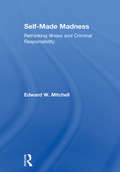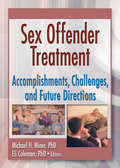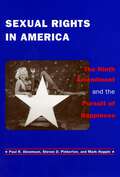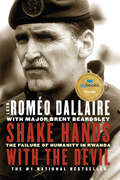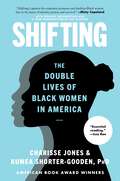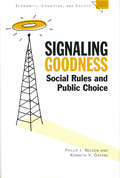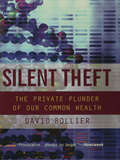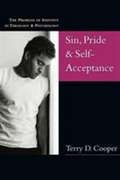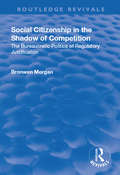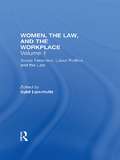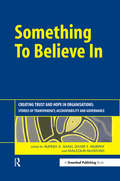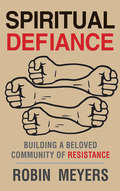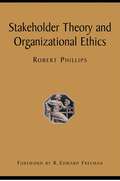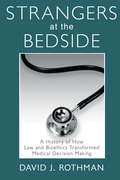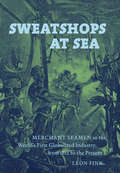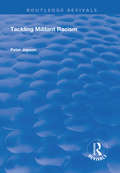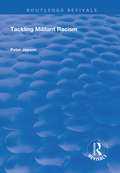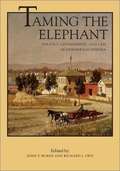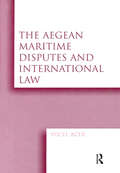- Table View
- List View
Self-Made Madness: Rethinking Illness and Criminal Responsibility
by Edward W. MitchellThis multi-disciplinary book lies in the general areas of forensic psychiatry/psychology, sociology, jurisprudence, criminal law and criminology. It questions traditional assumptions about illness and mental disorder, and deals with the controversial notion that mental disorders (and possibly other 'illnesses') may be to varying extents the fault of the 'sufferer'. It examines how the law can take into account such 'culpable' notions of mental disorder in determining criminal responsibility. This culpability for the defense-causing condition (or 'responsibility for level of criminal responsibility') is called 'meta-responsibility'. The book is divided into two parts. The first section discusses theoretical issues, such as the manner in which traditional illness models relate to meta-responsibility; the insanity defence and other mental condition defences; the relationship of clinical issues such as medication non-compliance and insight to meta-responsibility and the counterfactual notion that consideration of the possible voluntary origins of mental disorder may benefit the criminal and non-criminal mentally disordered. The second section of the book presents a case vignette experiment of mock jurors, examining the effect of a 'meta-responsibility insanity test'.
Sex Offender Treatment: Accomplishments, Challenges and Future Directions
by Edmond J Coleman Michael MinerExamine the major advances in sexual offender treatment over the last decade and promising new concepts in treatment, supervision, and research Sex Offender Treatment: Accomplishments, Challenges, and Future Directions points the way toward humane, dignified, effective treatment regimes for sexual offenders. In addition to providing an essential overview of the current state of sex offender treatment, this book examines vital areas of service provision and research and points to future directions for the field. On the medical/psychological front, this volume explores the importance of recognizing comorbid psychiatric factors in treatment and of exploring central nervous system function's role as a cause of sexually inappropriate behavior. In the legislative/justice arena it illustrates a "Circles of Support" proposal that mobilizes community resources to aid the adjustment of released offenders rather than branding them as dangerous to the community. And in the area of service provision, this book presents a treatment approach for residential programs that is inspired by research on childhood behavioral problems and special education. This book will increase your effectiveness with: a model of multisystemic treatment for juvenile sex offenders a restorative justice approach for reintegrating adult offenders into the community a study of the physical/mental correlates of organic brain dysfunction a case report on the use of a pharmaceutical treatment (leuprolide acetate) for pedophiles
Sexual Rights in America: The Ninth Amendment and the Pursuit of Happiness
by Paul R. Abramson Steven D. Pinkerton Mark HuppinThe Constitution of the United States guarantees all Americans certain rights, such as the freedoms of speech and religious expression. But what guarantees our sexual freedoms? Sexual Rights in America presents a bold and intriguing look at the constitutional basis of sexual rights in America. Resurrecting the "forgotten" Ninth Amendment, which guarantees those fundamental rights not protected elsewhere in the Constitution, Abramson and colleagues argue that the freedom to choose how, when, and with whom we express ourselves sexually is integral to our happiness. Their careful review of the historical record reveals the importance of the "pursuit of happiness" in the socio-moral philosophy underpinning the Constitution. Sexual freedoms, they assert, are cut from the same cloth as the other freedoms protected by the Bill of Rights, and therefore, should be covered by the Ninth Amendment. Using concrete examples such as prostitution and phone sex, Sexual Rights in America illustrates the scope and limitations of Ninth Amendment sexual rights.
Shake Hands With the Devil: The Failure of Humanity in Rwanda
by Romeo DallaireOn the tenth anniversary of the date that UN peacekeepers landed in Rwanda, Random House Canada is proud to publish the unforgettable first-hand account of the genocide by the man who led the UN mission. Digging deep into shattering memories, General Dallaire has written a powerful story of betrayal, naïveté, racism and international politics. His message is simple and undeniable: “Never again.”When Lt-Gen. Roméo Dallaire received the call to serve as force commander of the UN intervention in Rwanda in 1993, he thought he was heading off on a modest and straightforward peacekeeping mission. Thirteen months later he flew home from Africa, broken, disillusioned and suicidal, having witnessed the slaughter of 800,000 Rwandans in only a hundred days. In Shake Hands with the Devil, he takes the reader with him on a return voyage into the hell of Rwanda, vividly recreating the events the international community turned its back on. This book is an unsparing eyewitness account of the failure by humanity to stop the genocide, despite timely warnings.Woven through the story of this disastrous mission is Dallaire’s own journey from confident Cold Warrior, to devastated UN commander, to retired general engaged in a painful struggle to find a measure of peace, reconciliation and hope. This book is General Dallaire’s personal account of his conversion from a man certain of his worth and secure in his assumptions to a man conscious of his own weaknesses and failures and critical of the institutions he’d relied on. It might not sit easily with standard ideas of military leadership, but understanding what happened to General Dallaire and his mission to Rwanda is crucial to understanding the moral minefields our peacekeepers are forced to negotiate when we ask them to step into the world’s dirty wars.Excerpt from Shake Hands with the DevilMy story is not a strictly military account nor a clinical, academic study of the breakdown of Rwanda. It is not a simplistic indictment of the many failures of the UN as a force for peace in the world. It is not a story of heroes and villains, although such a work could easily be written. This book is a cri de coeur for the slaughtered thousands, a tribute to the souls hacked apart by machetes because of their supposed difference from those who sought to hang on to power. . . . This book is the account of a few humans who were entrusted with the role of helping others taste the fruits of peace. Instead, we watched as the devil took control of paradise on earth and fed on the blood of the people we were supposed to protect.From the Hardcover edition.
Shared Beginnings, Divergent Lives: Delinquent Boys to Age 70
by John H. Laub Robert J. SampsonThis book analyzes newly collected data on crime and social development up to age 70 for 500 men who were remanded to reform school in the 1940s. Born in Boston in the late 1920s and early 1930s, these men were the subjects of the classic study Unraveling Juvenile Delinquency by Sheldon and Eleanor Glueck (1950). Updating their lives at the close of the twentieth century, and connecting their adult experiences to childhood, this book is arguably the longest longitudinal study of age, crime, and the life course to date. John Laub and Robert Sampson's long-term data, combined with in-depth interviews, defy the conventional wisdom that links individual traits such as poor verbal skills, limited self-control, and difficult temperament to long-term trajectories of offending. The authors reject the idea of categorizing offenders to reveal etiologies of offending--rather, they connect variability in behavior to social context. They find that men who desisted from crime were rooted in structural routines and had strong social ties to family and community. By uniting life-history narratives with rigorous data analysis, the authors shed new light on long-term trajectories of crime and current policies of crime control.
Shifting: The Double Lives of Black Women in America
by Kumea Shorter-Gooden Ms. Charisse JonesCommemorating its 20th year in print with a new Introduction and updated content, Shifting explores the many identities Black women must adopt in various spaces to succeed in America. Based on the African American Women's Voices Project, Shifting reveals that a large number of Black women feel pressure to compromise their true selves as they navigate America's racial and gender bigotry. Black women "shift" by altering the expectations they have for themselves or their outer appearance. They modify their speech. They shift "white" as they head to work in the morning and "Black" as they come back home each night. They shift inward, internalizing the searing pain of the negative stereotypes that they encounter daily. And sometimes they shift by fighting back. In commemoration of its twentieth year in print with a new Introduction and updated content throughout Shifting is a much-needed, clear, and comprehensive portrait of the reality of Black women's lives today.
Signaling Goodness
by Phillip J. Nelson Kenneth V. GreenePolitical, intellectual, and academic discourse in the United States has been awash in political correctness, which has itself been berated and defended -- yet little understood. As a corrective, Nelson and Greene look at a more general process: adopting political positions to enhance one's reputation for trustworthiness both to others and to oneself. Phillip Nelson and Kenneth Greene are Professors of Economics in the Department of Economics at the State University of New York, Binghamton.
Silent Theft: The Private Plunder of Our Common Wealth
by David Bollier'They hang the man and flog the woman That steal the goose from off the common, But let the greater villain loose That steals the common from the goose.' - Traditional nursery rhyme Until a 1998 federal court decision, a Minnesota publisher claimed to own every federal court decision, including Roe v. Wade and Brown v. Board of Education. A Texas c
Sin, Pride and Self-Acceptance: The Problem of Identity in Theology and Psychology
by Terry D. CooperWhat is at the root of the problem of humanity? Is it pride or lack of self-esteem?Do we love ourselves too much or too little?The debate about the human condition has often been framed this way in both theological and psychological circles. Convictions about preaching, teaching, marriage and child rearing, as well as politics, social welfare, business management and the helping professions, more often than not, fall on one side or the other of this divide. With theological and psychological insight Terry D. Cooper provides trenchant analysis of this centuries-long debate and leads us beyond the usual impasse. Humanistic psychology has often regarded traditional Christianity as its archrival in assessing the human condition. Cooper demonstrates how the Christian doctrine of a sinful and fallen humanity sheds light on the human condition which exhibits both pride and self-denigration. Bringing theological insights ranging from Augustine and John Calvin to Reinhold Niebuhr together with the psychological theories of Freud, Jung, Carl Rogers, Gerald May and Karen Horney, Cooper guides readers through the maze of competing claims to a resolution which affirms Christian conviction while critically engaging modern psychological theory. A model of the proper integration of Christian theology and the discipline of psychology,Sin, Pride & Self-Acceptance will be of special help to students and practitioners of psychology, pastoral counseling and clinical psychology.
Social Citizenship in the Shadow of Competition: The Bureaucratic Politics of Regulatory Justification (Law, Justice and Power)
by Bronwen MorganSocial Citizenship in the Shadow of Competition explores how economic concepts and tools are reshaping regulatory law. Building on studies that link law - both institutionally and discursively - to the legitimation of economic neo-liberalism, the book charts lawmakers' attempts to justify social welfare regulation in the language imposed by economic theory. It presents new qualitative findings from an ambitious regulatory reform programme targeting over 1,700 pieces of legislation. Bronwen Morgan argues that the interplay between economic discourse and lawmaking does not destroy the possibility of social citizenship; however, the subsequent regulatory conversations frequently silence or weaken the claims of vulnerable groups. Thus, even when vulnerable groups secure instrumental success, economic conceptions of bureaucratic rationality impoverish their capacity to express certain kinds of intangible values and aspirations. To expand or retain social citizenship requires that we learn to conceive of what matters in political economy without relying on the logic of utility or other instrumental rationalities.
Social Feminism, Labor Politics, and the Law: Women, the Law, and the Workplace (Controversies in Constitutional Law #1)
by Sybil LipschultzEqual rights for women in the workplace is a critical aspect of the twentieth century civil rights movement, as well as an issue of academic and public interest. Bringing together legal rulings and commentary, this three-volume collection documents the development of legal protections for women in the workplace. The comprehensive coverage encompasses the major legal and constitutional issues, including the legal arguments that lead to the reduction of working hours for women and the argumentation that framed the debates over minimum wage legislation. The set also presents more contemporary issues of gender equality versus gender difference, in matters such as maternity leave and health hazards in the workplace for pregnant women. As the interest in the intersection of law and women's studies surges, this important new collection will become an essential guide to students and scholars, as well as lay readers. This volume is available on its own or as part of the three-volume set, Women, the Law, and the Workplace.. For a complete list of the volume titles in this set, see the listing for Women, the Law, and the Workplace
Something to Believe In: Creating Trust and Hope in Organisations: Stories of Transparency, Accountability and Governance
by Malcolm McIntosh Rupesh A. Shah David F. MurphyIn a world where trust in politicians, corporations and the processes that determine our lives continues to dwindle, this innovative book brings together research, case studies and stories that begin to answer a central question for society: How we can create organisations, institutions, groups and societies that can nurture trusting relationships with one another and among individuals?Something to Believe In provides a fresh take on the corporate responsibility debate, based as it is on the work of key global thinkers on corporate social responsibility, along with a raft of work developed from collaborations between the New Academy of Business and the United Nations Volunteers, UK Department for International Development and TERI-Europe in countries such as Brazil, Nicaragua, Ghana, India, Sri Lanka, Bangladesh, Lebanon, Nigeria, the Philippines and South Africa. The focus is on business, and particularly how deeper, more systemic changes to current ways of understanding and undertaking business can and have been enacted in both developed countries and in nations where the Western concept of CSR means nothing. The market-based model of economic thinking-the increasingly distrusted globalisation project-which threatens to sweep all before it is challenged by many of the contributions to this book.The book tells stories such as the mobilization of civil society in Ghana to bring business to account; the reorientation of a business school to focus on values; the life-cycle of ethical chocolate; the accountability of the diamond business in a war zone; the need to reinvent codes of conduct for women workers in the plantations and factories of Nicaragua; a Philippine initiative to economically empower former Moslem liberation fighters; and the development of local governance practices in a South African eco-village.The book is split into four sections. "Through Some Looking Glasses" contains short, thought-provoking pieces about the issues of trust, belief and change from writers including Thabo Mbeki, Malcolm McIntosh and a reprinted piece from E.M. Forster. Section Two asks how it will be possible to believe in our corporations and provides new approaches from around the world on how space is being opened up to found businesses that are able to create trust. Section Three examines the role of auditing in fostering trust. Corporations continue to attempt to engender trust through their activities in philanthropy, reporting and voluntary programmes. But, post-Enron et al., even the most highly praised corporate mission statements are tarnished. Can social and environmental audits of corporate reports, codes and practices assuage our doubts about boardroom democracy? Section Four examines alternative forms of accountability, transparency and governance from around the world and offers some different ways of thinking about the practice of creating trust in society.Something to Believe In provides a host of fascinating suggestions about redefining and renewing the underlying deal between society and its organizations. It will become a key text for students, thinkers and practitioners in the field of corporate responsibility.
Spiritual Defiance
by Robin MeyersDuring his thirty-year career as a parish minister and professor, Robin Meyers has focused on renewing the church as an instrument of social change and personal transformation. In this provocative and passionate book, he explores the decline of the church as a community of believers and calls readers back to the church's roots as a community of resistance. Shifting the conversation about church renewal away from theological purity and marketing strategies that embrace cultural norms, and toward "embodied noncompliance" with the dominant culture, Meyers urges a return to the revolutionary spirit that marked Jesus's ministry. Framing his discussion around three poems by twentieth-century Polish poet Anna Kamienska, Meyers casts the nature of faith as a force that stands against anything and everything that engenders death and indignity. He calls for active--sometimes even subversive--defiance of the ego's temptations, of what he terms "the heresy of orthodoxy itself," and of an uncritical acceptance of militarism and capitalism. Each chapter is a poignant and urgent invitation to recover the Jesus Movement as a Beloved Community of Resistance.
Stakeholder Theory and Organizational Ethics
by Robert PhillipsBusiness ethics is a staple in the news today. One of the most difficult ethical questions facing managers is, To whom are they responsible? Organizations can affect and are affected by many different constituencies-these groups are often called stakeholders. But who are these stakeholders? What sort of managerial attention should they receive? Is there a legal duty to attend to stakeholders or is such a duty legally prohibited due to the shareholder wealth maximization imperative? In short, for whose benefit ought a firm be managed? Despite the ever growing importance of these questions, there is no comprehensive, theoretical treatment of the stakeholder framework currently in print. In Stakeholder Theory and Organizational Ethics, Robert Phillips provides an extended defense of stakeholder theory as the preeminent theory of organizational ethics today. Addressing the difficult question of what the moral underpinning of stakeholder theory should be, Phillips elaborates a "principle of stakeholder fairness" based on the ideas of the late John Rawls-the most prominent moral and political philosopher of the twentieth century. Phillips shows how this principle clarifies several long-standing questions in stakeholder theory, including: Who are an organization's legitimate stakeholders? What is the basis for this legitimacy? What, if any, are the limits of stakeholder theory? What is the relationship between stakeholder theory and other moral, political, and business ethical theories? Applying research from many related disciplines, Stakeholder Theory and Organizational Ethics is an overdue response to several long-standing and fundamental points of contention within business ethics and management theory.
Strangers at the Bedside: A History of How Law and Bioethics Transformed Medical Decision Making (Social Institutions And Social Change Ser.)
by David J. RothmanDavid Rothman gives us a brilliant, finely etched study of medical practice today. Beginning in the mid-1960s, the practice of medicine in the United States underwent a most remarkable--and thoroughly controversial--transformation. The discretion that the profession once enjoyed has been increasingly circumscribed, and now an almost bewildering number of parties and procedures participate in medical decision making.Well into the post-World War II period, decisions at the bedside were the almost exclusive concern of the individual physician, even when they raised fundamental ethical and social issues. It was mainly doctors who wrote and read about the morality of withholding a course of antibiotics and letting pneumonia serve as the old man's best friend, of considering a newborn with grave birth defects a "stillbirth" thus sparing the parents the agony of choice and the burden of care, of experimenting on the institutionalized the retarded to learn more about hepatitis, or of giving one patient and not another access to the iron lung when the machine was in short supply. Moreover, it was usually the individual physician who decided these matters without formal discussions with patients, their families, or even with colleagues, and certainly without drawing the attention of journalists, judges, or professional philosophers.The impact of the invasion of outsiders into medical decision-making, most generally framed, was to make the invisible visible. Outsiders to medicine--that is, lawyers, judges, legislators, and academics--have penetrated its every nook and cranny, in the process giving medicine exceptional prominence on the public agenda and making it the subject of popular discourse. The glare of the spotlight transformed medical decision making, shaping not merely the external conditions under which medicine would be practiced (something that the state, through the regulation of licensure, had always done), but the very substance of medical pract
Suffering in Silence: The Links between Human Rights Abuses and HIV Transmission to Girls in Zambia
by Human Rights WatchSexual abuse of girls in Zambia fuels the HIV/AIDS epidemic and the strikingly higher HIV prevalence among girls than boys, Human Rights Watch said today. Concerted national and international efforts to protect the rights of girls and young women are key to curbing the AIDS epidemic's destructive course.
Suppressing the Financing of Terrorism
by International Monetary FundA report from the International Monetary Fund.
Suspicion of Madness: Suspicion Of Madness And Suspicion Of Rage (The Suspicion Series #7)
by Barbara Parker&“Suspense builds&” as a tropical storm and a crazed killer bear down on Connor and Quintana in the Florida Keys, in the New York Times–bestselling series (Library Journal). Despite storm warnings, lawyers and lovers Gail Connor and Anthony Quintana travel to a resort on a secluded island in the Florida Keys when a wealthy former client asks for their help with his troubled stepson, Billy, who has confessed to murder. Billy had a history with the victim—a resort employee with a promiscuous reputation and a penchant for causing trouble. But it soon becomes apparent that plenty of people may have wanted Sandra McCoy silenced for good . . . along with anyone who gets in the way. An Edgar Award finalist for the first book in the bestselling series, Suspicion of Innocence, as well as a former prosecutor herself, Barbara Parker once again gives readers a &“lively legal romp&” (Booklist). Suspicion of Madness is the 7th book in the Suspicion series, but you may enjoy reading the series in any order.
Sweatshops at Sea Merchant Seamen in the World's First Globalized Industry, From 1812 to the Present
by Leon FinkAs the main artery of international commerce, merchant shipping was the world's first globalized industry, often serving as a vanguard for issues touching on labor recruiting, the employment relationship, and regulatory enforcement that crossed national borders. InSweatshops at Sea, historian Leon Fink examines the evolution of laws and labor relations governing ordinary seamen over the past two centuries. The merchant marine offers an ideal setting for examining the changing regulatory regimes applied to workers by the United States, Great Britain, and, ultimately, an organized world community. Fink explores both how political and economic ends are reflected in maritime labor regulations and how agents of reform--including governments, trade unions, and global standard-setting authorities--grappled with the problems of applying land-based, national principles and regulations of labor discipline and management to the sea-going labor force. With the rise of powerful nation-states in a global marketplace in the nineteenth century, recruitment and regulation of a mercantile labor force emerged as a high priority and as a vexing problem for Western powers. The history of exploitation, reform, and the evolving international governance of sea labor offers a compelling precedent in an age of more universal globalization of production and services.
Tackling Militant Racism
by Peter JepsonThis title was first published in 2003. Militant racism is concerned with antagonism and hostility associated with racist activity. Within a society it is expressed by material that may stir up racial hatred and/or discrimination. It can also be seen on the streets and, indeed, the alleged racist criminality orchestrated by militant gangs. After examining the possible causes of militant racism and its effects, this book considers the new laws designed to tackle racially-motivated crime found in the 1998 Crime and Disorder Act. A central theme of the book is the balance between freedom of expression and penalizing racially-offensive expression.
Tackling Militant Racism (Routledge Revivals Ser.)
by Peter JepsonThis title was first published in 2003. Militant racism is concerned with antagonism and hostility associated with racist activity. Within a society it is expressed by material that may stir up racial hatred and/or discrimination. It can also be seen on the streets and, indeed, the alleged racist criminality orchestrated by militant gangs. After examining the possible causes of militant racism and its effects, this book considers the new laws designed to tackle racially-motivated crime found in the 1998 Crime and Disorder Act. A central theme of the book is the balance between freedom of expression and penalizing racially-offensive expression.
Taming the Elephant: Politics, Government, and Law in Pioneer California
by John F. Burns Richard J. OrsiLively, authoritative essays on the political history of California from the Gold Rush and the achievement of statehood through the end of the 19th century. The fourth and final volume in a series of essays on California history, co-published with the California State Historical Society.
The Aegean Maritime Disputes and International Law
by Yucel AcerThis key work analyses the disputes between Greece and Turkey as to their respective rights in the Aegean Sea, paying particular attention to the claims regarding territorial waters, the continental shelf, and the yet to be declared exclusive maritime zones in the area. While many earlier studies have concentrated on political factors, this study provides an exhaustive analysis of the relevant principles of international law in general and rules and principles of maritime law in particular, identifying the legal principles appropriate to the settlement of the Aegean dispute. With this regard, it makes a detailed examination of all the related aspects of the Aegean Sea and its islands, as well as the legal arguments of Greece and Turkey on the disputes concerned. It also clarifies the prospects for settling the dispute on the basis of international law, either by the two parties involved, or by the intervention of a third party such as the International Court of Justice. As such, it offers an important study of a particular problem, but one that can be used as a case study for other international disagreements.
The Alexia Lindale Collection: Life Support and Life Everlasting (An Alexia Lindale Novel)
by Robert WhitlowFrom the Christy-award-winning author of The List, The Trial, and The Sacrifice comes two twisting tales of tough decisions, mixed motives, and mysterious, healing grace.Life SupportAlexia Lindale knows her new case is a matter of life and death. She doesn't have a clue what it will do to her heart . . . and soul.Baxter Richardson survived a fall from a cliff while hiding in the mountains. Whether he'll make it through the next few weeks is unclear. His survival depends on the machines that help him breathe. On the haunted, unstable wife who wants to pull the plug and hide her secrets. On the doting father who wants him alive for reasons of love and money. On the conflicting legal documents that send the fight to court. And, on the music and prayers of an extraordinarily gifted pianist.Life EverlastingWith her client's husband somewhere between this world and the next, attorney Alexia Lindale makes an everlasting choice.The youngest son of a family consumed by greed, Baxter Richardson lingers on this earth in a coma. His wife wants him dead to protect her secrets. His brother wants him dead to gain control of the family empire. And though Baxter's father fights to keep him alive, even he has ulterior motives.But Baxter has a surprising ally. A classically trained pianist, Ted Morgan believes music can be used as prayer. And Ted's divinely-inspired playing has been slowly pulling Baxter back from the brink of death.Attorney Alexia Lindale represents Baxter's wife, Rena, but has no idea that she and her client are being played in a game that has higher stakes than a single legal case.The stronger Baxter grows, the more endangered he becomes. As Alexia navigates her responsibilities to her client, her relationship with the gifted musician, and her new relationship with God, she must discern the truth as it pertains to life, death, and life everlasting.
The American Jury System
by Randolph N. JonakaitHow are juries selected in the United States? What forces influence juries in making their decisions? Are some cases simply beyond the ability of juries to decide? How useful is the entire jury system? "In this important and accessible book, a prominent expert on constitutional law examines these and other issues concerning the American jury system. Randolph N. Jonakait describes the historical and social pressures that have driven the development of the jury system; contrasts the American jury system to the legal process in other countries; reveals subtle changes in the popular view of juries; examines how the news media, movies, and books portray and even affect the system; and discusses the empirical data that show how juries actually operate and what influences their decisions. Jonakait endorses the jury system in both civil and criminal cases, spelling out the important social role juries play in legitimizing and affirming the American justice system. "--BOOK JACKET. Title Summary field provided by Blackwell North America, Inc. All Rights Reserved
